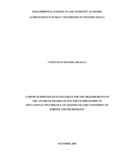INTRAPERSONAL CONFLICTS ANDSTUDENTS’ACADEMIC ACHIEVEMENT INPUBLIC UNIVERSITIESIN WESTERN KENYA
Abstract
Provision of university education to qualified Kenyans is fundamental to the success of the Government’s overall sustainable development strategy. Academic achievement plays a significant rolein assuring quality education. University students have a similar characterized life trend full of intrapersonal conflicts. This is caused by the usual ways of modeling and ensuring they stay relevant to the demands of others and the environment. As a result, undesirable outcomes such as frustrations, emotional stress and socially destructive behaviors influence their academic performance. These outcomes have often influencedacademic achievement to a large extent. The purpose of this study was to assessthe influence of intrapersonal conflictson students ‘academicachievement in public universities in Western Kenya. Specific objectives of the study were to: determine the influence of academic stress on students’ academic achievement in public universities inWestern Kenya; analyzetheinfluence of academic anxiety on students’ academic achievement in public universities in Western Kenya; examineself-esteem influence on students’ academic achievement in public universities in Western Kenya, and evaluatethe influence of conflict intervention strategies on selected intrapersonal conflicts inpublic universities in WesternKenya. Social cognitive theory by Albert Bandura and developmental task theoryby Robert Havighurst wereused to guide the researcher. An ex post facto and Survey method research were adapted. Cochran’s sample size formula was used to calculate the sample size of third year university students. Stratified random sampling was used to ensure gender is proportionately represented. Simple random sampling technique was used to select student leaders, and Chairpersons of Academic Departments in the respective universities. Purposivesampling technique was used to select Deans of Students, and students’ counselors. Copies of questionnaire were used to collect data from selected third year (2017/2018) cohort of students. In-depth Interview schedules were used to collect datafrom Deans of Students, Students’ Counselors, and Chairpersons of Academic Departments. The researcher used Focused Group Discussion with student leaders. Cronbach’s alpha value for validity and reliability of instruments was 0.678 for all items. Collected data was processed and analyzed using descriptive statistics and inferential statistics (Chi-Square, Spearman’s rho Correlationand Regression Analysis).Qualitative data was analyzed thematically and thereafter merged for presentation.Thefindings of this study indicated that academic stress and anxiety influenced university students’academic achievement negatively. However, self-esteem had a positive influence on university students’academic achievement. It was noted that when Kenyan public universities apply conflict intervention strategies, academic stress and anxiety levels are reduced on one hand, while the self-esteem is improved on the other hand thus academic achievementis enhanced in public universities in Western Kenya. This study recommends that University Managementof Public Kenyan Universities should liaise with the Deans of faculties or schools, Chairpersonsof Academic Departments and work as a team to address intrapersonal conflicts. TheDean of Students office as an advisor, counseling services offered are critical in higher education institutions because academicachievement cannotbe attained without considering personal, social, psychological and emotional factors.
Collections
- School of Education [45]

